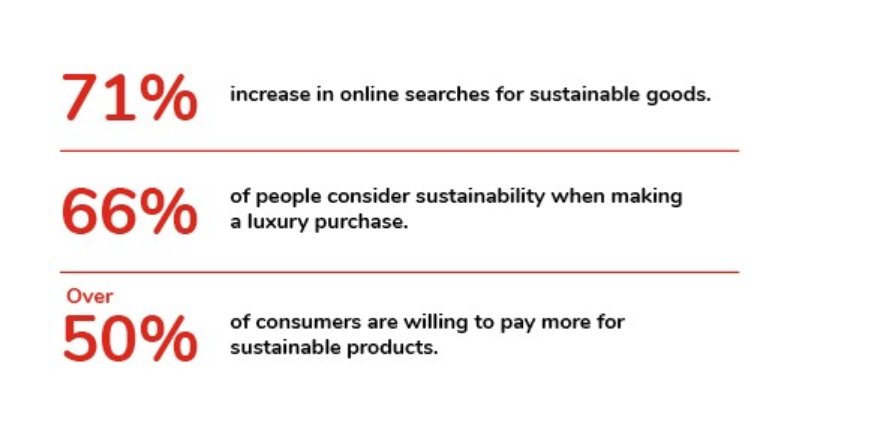
When we think about business sustainability, we tend to focus more on carbon emissions. But virtually, consumers are actively seeking out companies that prioritize sustainability and green initiatives even if they are not in the manufacturing sector.
Scientists across the globe have been raising alarm bells about the uncertain state of the environment. With mounting evidence of climate change, biodiversity loss, and resource depletion, it has become increasingly clear that the way we produce and consume goods has a profound impact on earth's future. Consumers are also awakening to the harsh realities of our current consumption habits. They are growing more concerned, seeking eco-conscious alternatives, and using their purchasing power to support sustainable practices. This collective consciousness is a testament to the growing urgency of addressing environmental issues.
Companies that proactively address sustainability concerns not only contribute to a more sustainable future, but also position themselves as leaders in a world where environmental consciousness is on the rise, creating a win-win situation for both their bottom line and the planet.
Read: How to Start a Profitable Online Store
A study by Adecco reveals that in the last one year there has been a 71% increase in online searches for sustainable goods while 66% of consumers consider sustainability while making purchases, and over 56% of consumers are willing to pay more for sustainable products.

This statistic underscores the idea that sustainability is not just a buzzword but a genuine value that people are willing to invest in. Businesses that overlook this fact not only miss out on potential revenue but also face the risk of damaging their reputation. As consumers are increasingly becoming conscientious about their environmental impact, brands and stores that fail to align with these new demands may find their credibility and standing erode over time. Sustainable practices are not a passing trend; they are a necessity for staying relevant and competitive in a market that is evolving toward a more eco-conscious future. Businesses that embrace sustainability today not only secure their place in the market but also position themselves for a future where sustainable processes are essential to success in the new era.
Pillars of Business Sustainability: Business sustainability is often understood through the framework of the three pillars which encompass economic, social, and environmental aspects. These pillars serve as a holistic approach for businesses to make responsible decisions and create a positive impact on both society and the planet. Let's explore these three pillars in the context of brands and retail:
Environmental Sustainability: This pillar focuses on minimizing the negative impact of business operations on the environment. Retail brands can adopt various practices to enhance environmental sustainability, such as:
Sustainable Sourcing: Sourcing products and materials from suppliers committed to environmentally responsible practices, using recycled or sustainably sourced materials, and reducing waste through recycling and composting programs.
Social Sustainability: Social sustainability emphasizes ethical and fair practices throughout the supply chain, ensuring that the well-being of workers, communities, and customers is prioritized.
Economic Sustainability: Economic sustainability involves ensuring the long-term viability and profitability of a brand or retail business while considering its broader economic impact.
Read: Tips on How to Run a Successful Online Store
Product Lifecycle Analysis:
Conducting a comprehensive product lifecycle analysis is an essential step in the journey towards greater sustainability for e-commerce businesses. This process involves scrutinizing every aspect of a product's journey, from the initial sourcing of materials through manufacturing, distribution, and eventual disposal. By undertaking this analysis, businesses can pinpoint areas where they can make environmentally responsible decisions and reduce their overall environmental impact. This might involve choosing sustainable materials, optimizing production processes, minimizing energy consumption, reducing waste, and encouraging responsible product disposal and recycling. Ultimately, a thorough product lifecycle analysis empowers companies to make informed, eco-conscious decisions that benefit both the environment and their bottom line, reinforcing their commitment to sustainability in the eyes of consumers.
Reduced Returns:
One of the key strategies in the pursuit of sustainability for e-commerce businesses is reducing returns, a practice that not only saves costs but also helps minimize transportation-related emissions. By implementing detailed product descriptions, high-quality images, and comprehensive size guides, companies can empower their customers to make well-informed purchase decisions.
This not only reduces the likelihood of returns due to issues like misfit or dissatisfaction but also results in fewer shipments needed to rectify such problems. In turn, this reduction in return shipments contributes to a smaller carbon footprint, aligning with environmentally responsible practices. By providing customers with the information, they need to make the right choices from the outset, e-commerce businesses can both enhance their sustainability efforts and improve the overall shopping experience.
Green Packaging:
Green packaging is a strategy for modern businesses aiming to minimize their environmental impact. By opting for eco-friendly materials like recyclable cardboard and biodegradable or compostable packaging, companies can significantly reduce packaging waste and its associated harm to the planet. Equally important is the implementation of efficient packaging designs that maximize space utilization, minimizing the need for excess materials during shipping.
This dual approach not only contributes to environmental sustainability by decreasing the carbon footprint but also often results in cost savings and improved brand reputation, as consumers increasingly prioritize products with eco-conscious packaging. Green packaging, therefore, represents a win-win solution for businesses looking to align with sustainability goals and meet the demands of an environmentally conscious consumer base.
Customer Education
Customer education plays a pivotal role in fostering sustainability in e-commerce. Beyond simply selling products, businesses have a unique opportunity to raise environmental awareness and empower their customers to make eco-conscious choices. By educating customers about the environmental impact of their decisions, whether it's the choice of products or disposal practices, companies can inspire more sustainable lifestyles. Encouraging customers to recycle packaging and participate in recycling programs not only reduces waste but also demonstrates a brand's commitment to environmental responsibility. Providing tips and resources for sustainable living not only adds value to the customer experience but also strengthens the bond between businesses and their environmentally conscious clientele, collectively contributing to a more sustainable future for all.
Sustainability offers a wide range of benefits for businesses, making it not only an ethical imperative but also a strategic advantage. Here are some key benefits:
Brand Reputation: Businesses that prioritize sustainability build a positive brand image, fostering trust and loyalty among customers. Sustainability can be a strong differentiator in a competitive market.
Increased Market Share: As consumer awareness and demand for eco-friendly products and practices grow, businesses that embrace sustainability can capture a larger share of the market.
Risk Mitigation: Sustainable practices can help companies adapt to changing regulations and consumer preferences. They are less vulnerable to legal and reputational risks associated with environmental issues.
Innovation and Efficiency: Pursuing sustainability can drive innovation, leading to the development of new, more efficient processes and products. This innovation can enhance competitiveness.
Access to New Markets: Businesses that adopt sustainable practices may find it easier to enter international markets, as many countries have environmental regulations and preferences for sustainable products.
Customer Loyalty: Customers who align with a company's sustainability values are more likely to become loyal, repeat customers and brand advocates.
Investor Attraction: Sustainable companies are often viewed as less risky by investors and can access a broader range of funding sources, including impact investors and sustainability-focused funds.
Government Incentives: Some governments offer tax incentives, grants, and subsidies to businesses that adopt sustainable practices, further reducing costs.